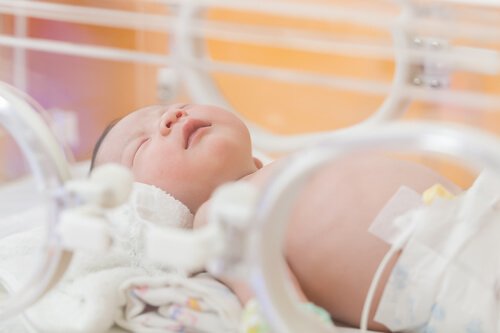Premature Birth During the 7th Month of Pregnancy

When we refer to babies born at 7 months, we’re talking about those who are born between the 28th and 32nd week of pregnancy. Fortunately, in this type of premature birth, newborns have good chances at survival.
However, babies who are born during the 7th month of gestation will need the help of a respirator. This is because their lungs are still immature.
They also haven’t developed certain reflexes yet, such as suction, which allows them to nurse. Therefore, they usually feed through a feeding tube.
Babies born at 7 months
Fetuses experience the most growth during the last 8 months of gestation. Being born between the 28th and 32nd week means that babies only acquire a third of their ideal birth weight.
When this occurs, babies that are born at 7 months need the attention of a neonatal resuscitation unit immediately. There, medical professionals will provide special care and treatment until all the baby’s systems mature.
Unfortunately, the lungs are the organs that suffer the most when it comes to these premature babies.
Premature birth at this point means that babies don’t have enough pulmonary surfactant. This vital substance allows for the exchange of oxygen among tissues.
At the same time, there are several organs that are still underdeveloped at this point. These include the brain, lungs and kidneys. The digestive system and immune system aren’t fully functioning yet.
At birth, these babies need immediate neonatal attention in an incubator. In general, they receive respiratory assistance and special formula through a feeding tube.
If all is well, babies will then move to intensive therapy. Then, once their health is stable enough, they’ll go to the neonatal unit. Finally, when premature babies can breathe and feed properly without medical assistance, they can go home with their parents.

What are the causes of premature birth at 7 months?
There are different reasons that can cause a baby to be born at 7 months of gestation. In most cases, pregnancy complications are the cause of premature births during the 7th month. These complications make it impossible for the mother to reach full term.
These possible complications include the following:
- Pre-eclampsia and placenta previa.
- A malformation of the uterus which leaves the baby with insufficient space.
- Premature rupture of the amniotic sac or excessive opening of the uterus.
- Gestational diabetes.
- Fetal death or late-term miscarriage.
- Toxoplasmosis.
Other factors can cause premature birth as well, such as tobacco, alcohol and drug abuse. Mothers who don’t wish to increase their chances of premature birth should eliminate these substances completely.
“When you’re a mother, you’re never really alone in your thoughts. A mother always has to think twice, once for herself and once for her child”
—Sophia Loren—
Signs and symptoms of premature birth at 7 months
Premature birth isn’t generally painful, but there are several signs and symptoms to watch out for:
- Contractions in the uterus every 10 minutes or more often.
- Pain in the lower back.
- Menstrual cramps or cramps in the lower abdomen.
- An increase in pelvic pressure or pressure on the vagina.
- Increased vaginal discharge.
- Leakage of liquids from the vagina.
- Vaginal bleeding.
- Flu like symptoms such as nausea, vomiting and diarrhea.
- Decreased fetal movements or kicking.
What are some of the risks for the baby
In this day and age, advances in neonatal medicine have reduced the mortality rate among premature babies. This includes those born during the seventh month of gestation.
However, while the chances of survival are fairly good, these babies are still very fragile. Unfortunately, the risks are very high.
Immediate risks
At birth, these babies are placed in incubators in order to solve their common breathing problems. These problems are due to the fact that their lungs haven’t reached maturity yet and they need help breathing.
There are other risks having to do with the digestive system, arterial canal. These babies also run the risk or suffering neurological lesions. Given their delicate state, babies that are born at 7 months are also at high risk of infection.

Long-term risks
Currently, it’s impossible to determine exactly what the long-term consequences of premature birth at 7 months can be. To detect the risks, it’s important for babies to have an MRI and to monitor them through cerebral ultrasound.
In fact, the consequences of extreme prematurity can be very serious. These include motor disabilities, serious intellectual disabilities, sensorial alterations, diabetes, high blood pressure, etc.
Lastly, remember that if you have any doubts or you go into labor before your due date, contact your doctor immediately.
When we refer to babies born at 7 months, we’re talking about those who are born between the 28th and 32nd week of pregnancy. Fortunately, in this type of premature birth, newborns have good chances at survival.
However, babies who are born during the 7th month of gestation will need the help of a respirator. This is because their lungs are still immature.
They also haven’t developed certain reflexes yet, such as suction, which allows them to nurse. Therefore, they usually feed through a feeding tube.
Babies born at 7 months
Fetuses experience the most growth during the last 8 months of gestation. Being born between the 28th and 32nd week means that babies only acquire a third of their ideal birth weight.
When this occurs, babies that are born at 7 months need the attention of a neonatal resuscitation unit immediately. There, medical professionals will provide special care and treatment until all the baby’s systems mature.
Unfortunately, the lungs are the organs that suffer the most when it comes to these premature babies.
Premature birth at this point means that babies don’t have enough pulmonary surfactant. This vital substance allows for the exchange of oxygen among tissues.
At the same time, there are several organs that are still underdeveloped at this point. These include the brain, lungs and kidneys. The digestive system and immune system aren’t fully functioning yet.
At birth, these babies need immediate neonatal attention in an incubator. In general, they receive respiratory assistance and special formula through a feeding tube.
If all is well, babies will then move to intensive therapy. Then, once their health is stable enough, they’ll go to the neonatal unit. Finally, when premature babies can breathe and feed properly without medical assistance, they can go home with their parents.

What are the causes of premature birth at 7 months?
There are different reasons that can cause a baby to be born at 7 months of gestation. In most cases, pregnancy complications are the cause of premature births during the 7th month. These complications make it impossible for the mother to reach full term.
These possible complications include the following:
- Pre-eclampsia and placenta previa.
- A malformation of the uterus which leaves the baby with insufficient space.
- Premature rupture of the amniotic sac or excessive opening of the uterus.
- Gestational diabetes.
- Fetal death or late-term miscarriage.
- Toxoplasmosis.
Other factors can cause premature birth as well, such as tobacco, alcohol and drug abuse. Mothers who don’t wish to increase their chances of premature birth should eliminate these substances completely.
“When you’re a mother, you’re never really alone in your thoughts. A mother always has to think twice, once for herself and once for her child”
—Sophia Loren—
Signs and symptoms of premature birth at 7 months
Premature birth isn’t generally painful, but there are several signs and symptoms to watch out for:
- Contractions in the uterus every 10 minutes or more often.
- Pain in the lower back.
- Menstrual cramps or cramps in the lower abdomen.
- An increase in pelvic pressure or pressure on the vagina.
- Increased vaginal discharge.
- Leakage of liquids from the vagina.
- Vaginal bleeding.
- Flu like symptoms such as nausea, vomiting and diarrhea.
- Decreased fetal movements or kicking.
What are some of the risks for the baby
In this day and age, advances in neonatal medicine have reduced the mortality rate among premature babies. This includes those born during the seventh month of gestation.
However, while the chances of survival are fairly good, these babies are still very fragile. Unfortunately, the risks are very high.
Immediate risks
At birth, these babies are placed in incubators in order to solve their common breathing problems. These problems are due to the fact that their lungs haven’t reached maturity yet and they need help breathing.
There are other risks having to do with the digestive system, arterial canal. These babies also run the risk or suffering neurological lesions. Given their delicate state, babies that are born at 7 months are also at high risk of infection.

Long-term risks
Currently, it’s impossible to determine exactly what the long-term consequences of premature birth at 7 months can be. To detect the risks, it’s important for babies to have an MRI and to monitor them through cerebral ultrasound.
In fact, the consequences of extreme prematurity can be very serious. These include motor disabilities, serious intellectual disabilities, sensorial alterations, diabetes, high blood pressure, etc.
Lastly, remember that if you have any doubts or you go into labor before your due date, contact your doctor immediately.
All cited sources were thoroughly reviewed by our team to ensure their quality, reliability, currency, and validity. The bibliography of this article was considered reliable and of academic or scientific accuracy.
- Organización Mundial de la Salud (OMS). Nacimientos prematuros. 2008. [Disponible en línea].
- Standford Children’s Health. Prematurez. [Disponible en línea].
- Mendoza Tascón Luis Alfonso, Claros Benítez Diana Isabel, Mendoza Tascón Laura Isabel, Arias Guatibonza Martha Deyfilia, Peñaranda Ospina Claudia Bibiana. Epidemiología de la prematuridad, sus determinantes y prevención del parto prematuro. Rev. chil. obstet. ginecol. 2016; 81 (4): 330-342. [Disponible en línea]. http://dx.doi.org/10.4067/S0717-75262016000400012
This text is provided for informational purposes only and does not replace consultation with a professional. If in doubt, consult your specialist.








